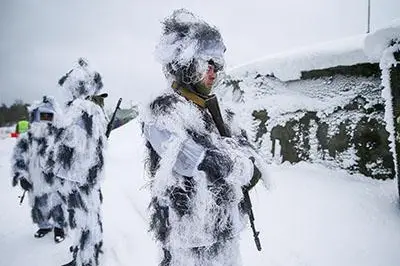PHOTO
MOSCOW/KYIV - Ukrainian government forces and pro-Russian rebels reported increased shelling in eastern Ukraine for a second straight day on Friday, an escalation that Washington and other Western allies say could form part of a Russian pretext to invade.
A diplomatic source with years of direct experience of the conflict described the shelling over the past two days as the most intense along the frontline in eastern Ukraine since major combat there ended with a 2015 ceasefire.
Russia denies Western accusations it is planning an all-out invasion of Ukraine, a country of over 40 million people, in what would potentially be Europe's worst war in generations.
Moscow has said this week it is drawing down forces massed near Ukraine. Western countries say they believe the opposite: more equipment and personnel are arriving and making the sort of preparations normally seen in the final days before an attack.
Financial markets are rattled by the prospect of a war that could disrupt global energy supplies and wreck the recovery from the pandemic crisis. They took some comfort from an announcement that U.S. Secretary of State Antony Blinken would meet Russian Foreign Minister Sergei Lavrov next week - provided Russia has not invaded first.
The marked escalation of shelling in eastern Ukraine, where government troops have faced Moscow-backed rebels since 2014, has stoked global alarm since Thursday. Both sides have said shelling stepped up dramatically, although so far no deaths have been reported.
The diplomatic source said close to 600 explosions were recorded on Friday morning, 100 more than on Thursday, some involving 152 mm and 122 mm artillery and large mortars. At least four rounds had been fired from tanks.
"They are shooting - everyone and everything," said the source. "There's been nothing like this since 2014-15."
The Kremlin called the situation in eastern Ukraine potentially very dangerous.
In the most detailed U.S. warning yet of the likelihood of war, Blinken told the U.N. Security Council Washington believed Russia was planning an all-out assault. It could begin with a manufactured pretext, possibly involving a faked attack and false accusations about the separatist conflict, Blinken said.
WESTERN HYSTERIA
U.S. President Joe Biden, rallying allies to maintain a unified stance, will host a call on Friday with leaders of Britain, Canada, France, Germany, Italy, Poland and Romania, plus the European Union and NATO.
The Kremlin has dismissed accusations it is planning an invasion as Western hysteria. Moscow said on Friday that a tank unit and two mechanised infantry units were heading back to bases in southern and central Russia following exercises.
But Russia has also forcefully pressed a set of security demands, including a promise Ukraine never be admitted into NATO, which the West calls a non-starter.
On Thursday Russia delivered a strongly-worded letter to the United States accusing it of ignoring Moscow's security demands and threatening unspecified "military-technical measures".
Russia announced President Vladimir Putin would personally supervise exercises of its strategic nuclear missile forces on Saturday, though it said these drills were no cause for alarm.
A quarrel over tit-for-tat diplomatic expulsions also heated up, after Moscow ordered out the number two official at the U.S. embassy in retaliation for what it said was the U.S. expulsion of an unidentified Russian diplomat. Washington called the move escalatory.
Ukraine itself has played down the likelihood that Russia will soon invade, often putting it at odds with its Western friends. Kyiv argues warnings of war play into Moscow's hands by sowing alarm and hurting the fragile Ukrainian economy.
"Our intelligence sees every move that could pose a potential threat to Ukraine. We estimate the probability of a large-scale escalation as low," Defence Minister Oleksii Reznikov told parliament on Friday.
BELARUS EXERCISES
Among the ambiguities surrounding the Kremlin's intentions are plans for tens of thousands of troops staging exercises in Belarus, north of Ukraine, due to end on Sunday. Moscow has said they would go back to Russia at some point after the drills, but has not said when.
The Russian-backed leader of Belarus, Alexander Lukashenko, who landed in Moscow on Friday to discuss the troop presence with Putin, suggested the Russians could stay.
"The armed forces will stay as long as needed," Lukashenko was quoted as saying by the state BelTa news agency.
Washington has made clear it will not send troops to defend Ukraine, but it and its allies will respond with financial sanctions, a threat Russia - already under santions since seizing Ukraine's Crimea peninsula in 2014 - has brushed off.
The United States has however sent extra troops to reinforce NATO countries bordering Ukraine. Defense Secretary Lloyd Austin announced on Friday during a visit to Warsaw that Washington would sell 250 Abrams tanks to Poland.
(Reporting by Reuters bureaux Writing by Peter Graff Editing by Gareth Jones)





















